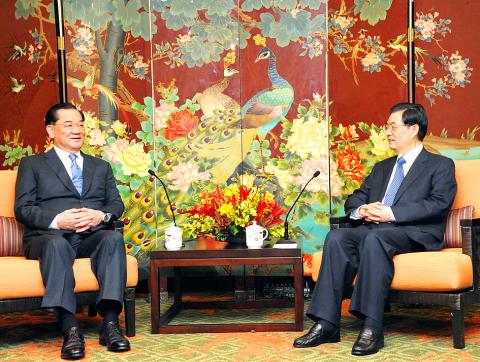President Ma Ying-jeou’s (馬英九) APEC envoy, Lien Chan (連戰), yesterday discussed the idea of signing a cross-strait peace agreement during a meeting with Chinese President Hu Jintao (胡錦濤), drawing criticism from the Democratic Progressive Party (DPP), which said this constituted a violation of Ma’s “10 guarantees.”
During his 55-minute meeting with Hu in Honolulu, Hawaii, prior to the main APEC leaders’ summit scheduled for yesterday and today, Lien put forward the issue of signing a cross-strait peace agreement, saying he hoped both sides “could start to exchange views on the peace issue.”
Lien expressed the hope that both sides could review the issue in due time, but that this should be a more long-term goal.

Photo: AFP
In Taipei, the Democratic Progressive Party (DPP) criticized Lien, saying his remarks suggested that “Ma’s ‘10 guarantees’ are a lie.”
The DPP was referring to the “10 guarantees” Ma gave late last month that include “one framework, two prerequisites, three principles and four assurances” that he said would need to be in place before Taiwan would consider working toward a peace accord with China.
DPP spokesperson Chen Chi-mai (陳其邁) said Lien should have focused his talks with Hu on issues relating to international trade.
“That Lien broached the [peace agreement] issue with Hu shows that the Chinese Nationalist Party [KMT] has already started to negotiate with the Chinese Communist Party [CCP] on the peace accord behind closed doors,” Chen said.
Noting that Ma had initially included negotiating a peace accord in his “golden decade” policy, but then later said a peace accord would not need to be limited to a decade, Chen added: “After Lien’s meeting with Hu yesterday, it seems that the negotiations aren’t going to take a decade as Ma said they would: They have already started. Ma has already started negotiations on a peace accord.”
Saying that since the annual KMT-CCP summit began in 2005 and a Lien-Hu communique was signed, which included a point on resuming cross-strait negotiations to achieve peace, Chen said: “Ma’s unilateral decision to use the results of the 2005 KMT-CCP closed-door negotiations as the guiding principle to negotiate a peace accord with China is using the will of one person and one party to decide the fate of the country.”
“The move is pushing Taiwanese toward fear and an uncertain future,” he said, adding: “Ma should tell us what he’s worried about and explain why his cross-strait policies are so contradictory and rash.”
During the Lien-Hu meeting yesterday, the two also touched on the so-called “1992 consensus.” Hu said both sides should stick to the consensus and safeguard the peaceful development of cross-strait ties, while Lien said the consensus is the basis for the peaceful development of cross-strait relations and the cornerstone of cross-strait trade benefits and prosperity.
Lien also urged China to speed up negotiations on a cross-strait investment protection agreement and follow-up issues relating to the cross-strait Economic Cooperation Framework Agreement.
According to Lien, Hu acknowledged the complex nature of the issues and said that they would be resolved one by one.
Additional reporting by Rich Chang
Translated by Jake Chung, Staff writer

SECURITY: As China is ‘reshaping’ Hong Kong’s population, Taiwan must raise the eligibility threshold for applications from Hong Kongers, Chiu Chui-cheng said When Hong Kong and Macau citizens apply for residency in Taiwan, it would be under a new category that includes a “national security observation period,” Mainland Affairs Council (MAC) Minister Chiu Chui-cheng (邱垂正) said yesterday. President William Lai (賴清德) on March 13 announced 17 strategies to counter China’s aggression toward Taiwan, including incorporating national security considerations into the review process for residency applications from Hong Kong and Macau citizens. The situation in Hong Kong is constantly changing, Chiu said to media yesterday on the sidelines of the Taipei Technology Run hosted by the Taipei Neihu Technology Park Development Association. With

CARROT AND STICK: While unrelenting in its military threats, China attracted nearly 40,000 Taiwanese to over 400 business events last year Nearly 40,000 Taiwanese last year joined industry events in China, such as conferences and trade fairs, supported by the Chinese government, a study showed yesterday, as Beijing ramps up a charm offensive toward Taipei alongside military pressure. China has long taken a carrot-and-stick approach to Taiwan, threatening it with the prospect of military action while reaching out to those it believes are amenable to Beijing’s point of view. Taiwanese security officials are wary of what they see as Beijing’s influence campaigns to sway public opinion after Taipei and Beijing gradually resumed travel links halted by the COVID-19 pandemic, but the scale of

A US Marine Corps regiment equipped with Naval Strike Missiles (NSM) is set to participate in the upcoming Balikatan 25 exercise in the Luzon Strait, marking the system’s first-ever deployment in the Philippines. US and Philippine officials have separately confirmed that the Navy Marine Expeditionary Ship Interdiction System (NMESIS) — the mobile launch platform for the Naval Strike Missile — would take part in the joint exercise. The missiles are being deployed to “a strategic first island chain chokepoint” in the waters between Taiwan proper and the Philippines, US-based Naval News reported. “The Luzon Strait and Bashi Channel represent a critical access

Pope Francis is be laid to rest on Saturday after lying in state for three days in St Peter’s Basilica, where the faithful are expected to flock to pay their respects to history’s first Latin American pontiff. The cardinals met yesterday in the Vatican’s synod hall to chart the next steps before a conclave begins to choose Francis’ successor, as condolences poured in from around the world. According to current norms, the conclave must begin between May 5 and 10. The cardinals set the funeral for Saturday at 10am in St Peter’s Square, to be celebrated by the dean of the College